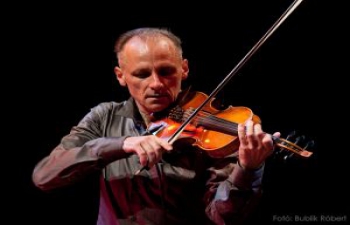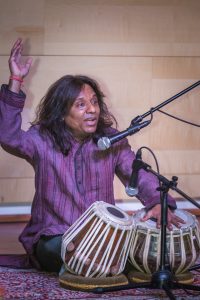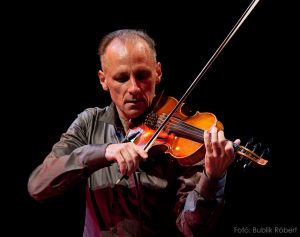Vacancy
Raga Fusion: Lantos Zoltán hegedű szólóestje / Raga Fusion: Violin solo performance by Zoltán Lantos
March 12, 2018

Kedves India-barátok!
Rendezvényeink regisztrációhoz kötöttek. A programok ingyenesek, de kérjük, hogy a honlapon lévő posztok elején található regisztrációs blokkot legyenek szívesek kitölteni, mielőtt ellátogatnak a programra. Köszönjük szépen a segítséget! / Dear Friends of India! All of our events require registration. The programmes are free, but please kindly fill up the registration form attached to the posts on the website if you visit the programme. Thank you very much for your help!
Kedves India-barátok!
Sok-sok tánc után ismét zenével jelentkezünk: 2017. november 7-én Lantos Zoltán hegedűművész lesz az Amrita Sher-Gil Kulturális Központ vendége. Bizonyára sokan ismerik már azt a különleges hangzásvilágot, ami Zoltán muzsikáját olyan egyedivé teszi; aki pedig még nem hallotta, itt az alkalom, hogy megismerje őt és magával ragadó játékát. Izgalmas, elmélyült, érdekes esti utazásra várunk mindenkit sok szeretettel!
A koncerten közreműködik: Pt Rajesh Gangani tablaművész.
Helyszín: Amrita Sher-Gil Kulturális Központ, 1025 Budapest, Búzavirág u. 14.
Időpont: 2017. november 7., 18.00
Kapunyitás: 17.30
A belépés ingyenes, de regisztrációhoz kötött.
***
We heartily invite all lovers of dance to a Violin solo performance of Zoltán Lantos – on 7 November, 2017 at 18.00 in the Auditorium of Amrita Sher-Gil Cultural Centre.
Date and time: 7 November, 2017, 18.00 hrs
Venue: 1025 Budapest, Búzavirág u. 14.
Gate opening: 17.30 hrs
Entry is free!
***
Lantos Zoltán hegedűs a világ jónéhány zenekultúrájában otthon érezheti magát, mégis, az európai jazz előretekintő, számos világzenei hatástól megtermékenyített vonulatát érzi magáénak.
Már főiskolai tanulmányai alatt feltűnt az itthoni és Kelet-európai jazz pódiumokon, de amint diplomát szerzett, azonnal megkezdte különös zenei (és földrajzi) utazását. Kezdettől fogva vonzotta az experimentális és a keleti zene, és a Dresch-kvartettben eltöltött két év után, 1985-ben Indiába utazott, hogy indiai klasszikus zenét tanuljon. Ez az a hely és kultúra ahol egyetlen hang „biológiája”, a nem hallható, „el nem játszott hang” („Anahata Swara”) belső élete rendkívüli jelentőséggel bír. Csak jelen lenni a pillanatban, egyszerű „egy”-ségben , önazonosságban – mind spirituális, mind fizikai értelemben – ezt jelenti azóta számára a komponálás és az improvizáció.
Kilenc évnyi tanulás, tanítás és koncertezés után 1994-ben visszatért Európába. Miközben egyre inkább rátalált saját, különleges hegedűhangjára, itthoni zenei gyökereit is újra fölfedezte, összevetve tapasztalatait az általa megismert Keleti tradiciókkal, illetve a kortárs európai jazz friss áramlataival. Itthon Horváth Kornéllal, Dés Lászlóval, Juhász Gáborral, később Lukács Miklóssal, Borbély Mihállyal, Kaltenecker Zsolttal dolgozott együtt, (elsősorban Mirrorworld nevű formációjában) és olyan nagyszerű külföldi muzsikussal találkozott a színpadon és a stúdióban, mint Charlie Mariano, Rabih Abou-Khalil, Dhafer Youssef, Steve Coleman, Eivind Aarset, Loreena McKennitt, Trilok Gurtu, George Brooks, Kai Eckhardt, Larry Coryell és mások.
Hegedűjátékában előszerettel alkalmazza az új technológiákat is, mint olyan eszközöket, amelyek újabb dimenziókat nyithatnak a zenei imagináció számára, hiszen a hangzás, a „sound” ugyanolyan fontos része a zenének, mint a dallam vagy a ritmus. A számára épített öthúros, és „indiai” rezonánshúros-hegedűk hangját olykor elektronikus eszközök, effektek, és live sampling teszik teljessé.
Válogatott diszkográfia:
Zoltán Lantos: Eclipse (szóló hegedű/ Tandem Records, 1997)
Zoltán Lantos: Mirrorworld (Fonó Records, 1998)
Zoltán Lantos’ Mirrorworld: Tiptoe Ceremony (BMC, 2002)
Zoltán Lantos’ Mirrorworld: Tau (X-produkció, 2008)
Ramesh Shotham’s: Madras Special with Charlie Mariano and Rabih Abou-Khalil (Permission Music, 2001)
Gábor Juhász/Palle Mikkelborg: 60/40 (BMC, 2004)
Ramesh Shotham: Urban Folklore (Double Moon Records, 2004)
Dhafer Youssef: Malak (Enja, 1999)
AZOPA: Makahia (November Music, 2000)
EVA Quartet & Hector Zazou, “The Ark” (Elen Music, 2012)
***
Zoltán Lantos is a violinist who is at home in musical cultures from across the globe — but has forged a sonic language all his own.
He appeared on the Eastern-European jazz scene while studying at the Music Academy in his hometown, Budapest. But shortly after earning his degree in classical violin, Lantos embarked on a remarkable musical journey. Drawn to experimental and eastern music, he traveled to India in 1985 to study classical Indian music. There, the “biology” of a single note — the life of the inner, unheard and unplayed sound (“Anahata Swara”) is of the utmost importance. In India he discovered what became the focal point of his musical life: the experience of existing in a living moment, the art of improvisation.
In 1994, after 9 years of studying, traveling, teaching, and performing in India, Lantos returned to Europe. Composing new pieces he began rediscovering his musical roots and found his own language by blending Hungarian and classical traditions with Eastern music and contemporary European jazz.Over the years Lantos’ musical voyage has brought him together with many great musicians on stage and in the studio. He has been working and recording with various artists like Ferenc Snétberger, Kornél Horváth, László Dés, Márta Sebestyén, Mihály Dresch, Gábor Juhász, Zsolt Kaltenecker from his native Hungary as well as Charlie Mariano, Dhafer Youssef, Palle Mikkelborg, Ramesh Shotham, Nicolas Simion, Renaud Garcia-Fons, Rabih Abou-Khalil, Urna Chahartugchi and many others. On stage he performed or toured with such as Loreena McKennitt, Al DiMeola, Larry Corryell, Didier Lockwood, Paolo Fresu, Renaud Garcia-Fons, Steve Coleman, George Brooks, Trilok Gurtu, Nils Petter Molvaer and Eivind Aarset.
Lantos’ main project since 1999 was the group “Mirrorworld” and his current project “OpenSource” (founded in 2011) is taking a more electronic, loop- and groove-oriented direction. After some changes of the lineup the new band — with áron Tálas on keyboards, Tibor Fonay on bass, László Csízi on drums and the DJ Andrew J — gave it’s first concert in november 2012 at MüPA (Palace of Arts) in Budapest with the Norwegian trumpeter Nils Petter Molvaer and electric guitarist Eivind Aarset, as well as Hungarian guest singers Veronika Harcsa, Kátya Tompos and the percussionist Kornél Horváth.
He also plays solo violin concerts using electronic devices for creating multiple loops and special effects.
With his group, as well as a guest artist of Nicolas Simion’s “Transylvanian Jazz” project or with the World Music group of the Mongolian singer Urna he has been invited to several international Jazz- and World music festivals across Europe and several other countries like India, China, Taiwan, Singapore, Thailand, Mongolia, Mexico and the US. Recently he teemed up with percussion whizz Kornél Horváth in duo and various other formations including live electronic artists. He also composes for theatre and dance.
Lantos recorded several albums in his homeland and also participated on many others all over the world. His first Mirrorworld album “Tiptoe Ceremony” became “Hungarian Jazz Album of the year” in 2003, and the next one entitled “Tau” was nominated as well for the same award in 2008. The first album of the Zoltán Lantos’ OpenSource is scheduled for 2013.
Zoltán Lantos plays a 5 string violin built by László Gáspár, a custom-built 5+16 sympathetic string violin (Tarangini) created by Ricardo Margarit and 5 string electric violin by NS Design.
He received the “Artisjus” prize in 2006 and the “Golden Cross of Merit” medal by the Hungarian Government in 2008.
Selected Discography:
Zoltán Lantos, “Pieces” (1996)
Zoltán Lantos, “Eclipse” (Solo/ Tandem Records, 1997)
Zoltán Lantos, “Mirrorworld” (Fonó Records, 1998)
Zoltán Lantos’ Mirrorworld, “Tiptoe Ceremony” (BMC, 2002)
Zoltán Lantos’ Mirrorworld, “Tau” (X-produkció, 2008)
Dhafer Youssef, “Malak” (Enja, 1999)
AZOPA, “Makahia” (November Music, 2000)
Ramesh Shotham, “Madras Special” (Permission Music, 2001) and “Urban Folklore” (Double Moon Records, 2004)
Gábor Juhász/Palle Mikkelborg, “60/40” (BMC, 2004)
Urna Chahartugchi, “Amilal” (Trees Music, 2005) and “Portrait” (Network Medien, 2012)
Tales of Tala, “Untold” (LopLop Records, 2011)
Nicolas Simion and WDR Bigband, “Balkan Jazz” (Bigband Records, 2010)
EVA Quartet & Hector Zazou, “The Ark” (Elen Music, 2012)



Rendezvényeink regisztrációhoz kötöttek. A programok ingyenesek, de kérjük, hogy a honlapon lévő posztok elején található regisztrációs blokkot legyenek szívesek kitölteni, mielőtt ellátogatnak a programra. Köszönjük szépen a segítséget! / Dear Friends of India! All of our events require registration. The programmes are free, but please kindly fill up the registration form attached to the posts on the website if you visit the programme. Thank you very much for your help!
Kedves India-barátok!
Sok-sok tánc után ismét zenével jelentkezünk: 2017. november 7-én Lantos Zoltán hegedűművész lesz az Amrita Sher-Gil Kulturális Központ vendége. Bizonyára sokan ismerik már azt a különleges hangzásvilágot, ami Zoltán muzsikáját olyan egyedivé teszi; aki pedig még nem hallotta, itt az alkalom, hogy megismerje őt és magával ragadó játékát. Izgalmas, elmélyült, érdekes esti utazásra várunk mindenkit sok szeretettel!
A koncerten közreműködik: Pt Rajesh Gangani tablaművész.
Helyszín: Amrita Sher-Gil Kulturális Központ, 1025 Budapest, Búzavirág u. 14.
Időpont: 2017. november 7., 18.00
Kapunyitás: 17.30
A belépés ingyenes, de regisztrációhoz kötött.
***
We heartily invite all lovers of dance to a Violin solo performance of Zoltán Lantos – on 7 November, 2017 at 18.00 in the Auditorium of Amrita Sher-Gil Cultural Centre.
Date and time: 7 November, 2017, 18.00 hrs
Venue: 1025 Budapest, Búzavirág u. 14.
Gate opening: 17.30 hrs
Entry is free!
***
Lantos Zoltán hegedűs a világ jónéhány zenekultúrájában otthon érezheti magát, mégis, az európai jazz előretekintő, számos világzenei hatástól megtermékenyített vonulatát érzi magáénak.
Már főiskolai tanulmányai alatt feltűnt az itthoni és Kelet-európai jazz pódiumokon, de amint diplomát szerzett, azonnal megkezdte különös zenei (és földrajzi) utazását. Kezdettől fogva vonzotta az experimentális és a keleti zene, és a Dresch-kvartettben eltöltött két év után, 1985-ben Indiába utazott, hogy indiai klasszikus zenét tanuljon. Ez az a hely és kultúra ahol egyetlen hang „biológiája”, a nem hallható, „el nem játszott hang” („Anahata Swara”) belső élete rendkívüli jelentőséggel bír. Csak jelen lenni a pillanatban, egyszerű „egy”-ségben , önazonosságban – mind spirituális, mind fizikai értelemben – ezt jelenti azóta számára a komponálás és az improvizáció.
Kilenc évnyi tanulás, tanítás és koncertezés után 1994-ben visszatért Európába. Miközben egyre inkább rátalált saját, különleges hegedűhangjára, itthoni zenei gyökereit is újra fölfedezte, összevetve tapasztalatait az általa megismert Keleti tradiciókkal, illetve a kortárs európai jazz friss áramlataival. Itthon Horváth Kornéllal, Dés Lászlóval, Juhász Gáborral, később Lukács Miklóssal, Borbély Mihállyal, Kaltenecker Zsolttal dolgozott együtt, (elsősorban Mirrorworld nevű formációjában) és olyan nagyszerű külföldi muzsikussal találkozott a színpadon és a stúdióban, mint Charlie Mariano, Rabih Abou-Khalil, Dhafer Youssef, Steve Coleman, Eivind Aarset, Loreena McKennitt, Trilok Gurtu, George Brooks, Kai Eckhardt, Larry Coryell és mások.
Hegedűjátékában előszerettel alkalmazza az új technológiákat is, mint olyan eszközöket, amelyek újabb dimenziókat nyithatnak a zenei imagináció számára, hiszen a hangzás, a „sound” ugyanolyan fontos része a zenének, mint a dallam vagy a ritmus. A számára épített öthúros, és „indiai” rezonánshúros-hegedűk hangját olykor elektronikus eszközök, effektek, és live sampling teszik teljessé.
Válogatott diszkográfia:
Zoltán Lantos: Eclipse (szóló hegedű/ Tandem Records, 1997)
Zoltán Lantos: Mirrorworld (Fonó Records, 1998)
Zoltán Lantos’ Mirrorworld: Tiptoe Ceremony (BMC, 2002)
Zoltán Lantos’ Mirrorworld: Tau (X-produkció, 2008)
Ramesh Shotham’s: Madras Special with Charlie Mariano and Rabih Abou-Khalil (Permission Music, 2001)
Gábor Juhász/Palle Mikkelborg: 60/40 (BMC, 2004)
Ramesh Shotham: Urban Folklore (Double Moon Records, 2004)
Dhafer Youssef: Malak (Enja, 1999)
AZOPA: Makahia (November Music, 2000)
EVA Quartet & Hector Zazou, “The Ark” (Elen Music, 2012)
***
Zoltán Lantos is a violinist who is at home in musical cultures from across the globe — but has forged a sonic language all his own.
He appeared on the Eastern-European jazz scene while studying at the Music Academy in his hometown, Budapest. But shortly after earning his degree in classical violin, Lantos embarked on a remarkable musical journey. Drawn to experimental and eastern music, he traveled to India in 1985 to study classical Indian music. There, the “biology” of a single note — the life of the inner, unheard and unplayed sound (“Anahata Swara”) is of the utmost importance. In India he discovered what became the focal point of his musical life: the experience of existing in a living moment, the art of improvisation.
In 1994, after 9 years of studying, traveling, teaching, and performing in India, Lantos returned to Europe. Composing new pieces he began rediscovering his musical roots and found his own language by blending Hungarian and classical traditions with Eastern music and contemporary European jazz.Over the years Lantos’ musical voyage has brought him together with many great musicians on stage and in the studio. He has been working and recording with various artists like Ferenc Snétberger, Kornél Horváth, László Dés, Márta Sebestyén, Mihály Dresch, Gábor Juhász, Zsolt Kaltenecker from his native Hungary as well as Charlie Mariano, Dhafer Youssef, Palle Mikkelborg, Ramesh Shotham, Nicolas Simion, Renaud Garcia-Fons, Rabih Abou-Khalil, Urna Chahartugchi and many others. On stage he performed or toured with such as Loreena McKennitt, Al DiMeola, Larry Corryell, Didier Lockwood, Paolo Fresu, Renaud Garcia-Fons, Steve Coleman, George Brooks, Trilok Gurtu, Nils Petter Molvaer and Eivind Aarset.
Lantos’ main project since 1999 was the group “Mirrorworld” and his current project “OpenSource” (founded in 2011) is taking a more electronic, loop- and groove-oriented direction. After some changes of the lineup the new band — with áron Tálas on keyboards, Tibor Fonay on bass, László Csízi on drums and the DJ Andrew J — gave it’s first concert in november 2012 at MüPA (Palace of Arts) in Budapest with the Norwegian trumpeter Nils Petter Molvaer and electric guitarist Eivind Aarset, as well as Hungarian guest singers Veronika Harcsa, Kátya Tompos and the percussionist Kornél Horváth.
He also plays solo violin concerts using electronic devices for creating multiple loops and special effects.
With his group, as well as a guest artist of Nicolas Simion’s “Transylvanian Jazz” project or with the World Music group of the Mongolian singer Urna he has been invited to several international Jazz- and World music festivals across Europe and several other countries like India, China, Taiwan, Singapore, Thailand, Mongolia, Mexico and the US. Recently he teemed up with percussion whizz Kornél Horváth in duo and various other formations including live electronic artists. He also composes for theatre and dance.
Lantos recorded several albums in his homeland and also participated on many others all over the world. His first Mirrorworld album “Tiptoe Ceremony” became “Hungarian Jazz Album of the year” in 2003, and the next one entitled “Tau” was nominated as well for the same award in 2008. The first album of the Zoltán Lantos’ OpenSource is scheduled for 2013.
Zoltán Lantos plays a 5 string violin built by László Gáspár, a custom-built 5+16 sympathetic string violin (Tarangini) created by Ricardo Margarit and 5 string electric violin by NS Design.
He received the “Artisjus” prize in 2006 and the “Golden Cross of Merit” medal by the Hungarian Government in 2008.
Selected Discography:
Zoltán Lantos, “Pieces” (1996)
Zoltán Lantos, “Eclipse” (Solo/ Tandem Records, 1997)
Zoltán Lantos, “Mirrorworld” (Fonó Records, 1998)
Zoltán Lantos’ Mirrorworld, “Tiptoe Ceremony” (BMC, 2002)
Zoltán Lantos’ Mirrorworld, “Tau” (X-produkció, 2008)
Dhafer Youssef, “Malak” (Enja, 1999)
AZOPA, “Makahia” (November Music, 2000)
Ramesh Shotham, “Madras Special” (Permission Music, 2001) and “Urban Folklore” (Double Moon Records, 2004)
Gábor Juhász/Palle Mikkelborg, “60/40” (BMC, 2004)
Urna Chahartugchi, “Amilal” (Trees Music, 2005) and “Portrait” (Network Medien, 2012)
Tales of Tala, “Untold” (LopLop Records, 2011)
Nicolas Simion and WDR Bigband, “Balkan Jazz” (Bigband Records, 2010)
EVA Quartet & Hector Zazou, “The Ark” (Elen Music, 2012)












